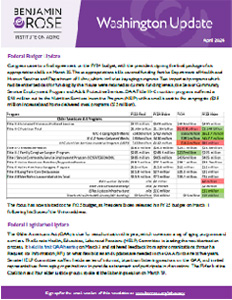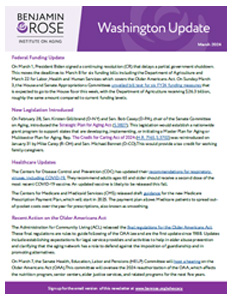Breadcrumb
- Home /
- Research & Education /
- Advocacy
Advocacy
Nested Applications
Advocacy Image

Advocacy Description
Benjamin Rose Institute on Aging is committed to staying engaged in, and sharing, the latest public policy news affecting older adults, caregivers and the professionals who care for them.
Check out current policy news below!
Happy Older Americans Month!
Each May, the Administration for Community Living (ACL) leads the national observance for Older Americans Month. This year’s theme, Powered By Connection, emphasizes the positive impact of socialization and meaningful relationships. President Biden released a proclamation for May 2024 to be Older Americans Month.
Legislative Updates
In early April, Representative Tom Cole (R-OK) was elected as the new Chair of the House Appropriations Committee, replacing Kay Granger (R-TX) who is not running for reelection.
The Protecting Seniors From Emergency Scams Act (H.R.8023) was introduced by Rep. Robin Kelly (DIL) and Troy Balderson (R-OH). The bill enhances existing elder justice programs by requiring the Federal Trade Commission to develop a web portal that tracks scams by region, and contact information for local law
enforcement.
The Long-Term Care Workforce Support Act (S.4120) was introduced by Sen. Casey (D-PA), Chairman of the Senate Special Committee on Aging, Sen. Kaine (D-VA), and Sen. Baldwin (D-WI). This provides substantial funding for the caregiving workforce. The companion bill (H.R.7994) was introduced in the House of Representatives by Rep. Dingell.
The bipartisan Improving Access to Medicare Coverage Act (S.4137) was introduced by Sens. Sherrod Brown (D-OH), Susan Collins (R-ME), and Sheldon Whitehouse (D-RI) to help protect seniors from high medical costs. It would allow Medicare to cover post-hospitalization skilled nursing care for hospital patients under observation status.
Administrative Updates
The Federal Trade Commission, Department of Justice, and the Department of Health and Human Services launched an inquiry into private equity firms and corporations’ role in health care. This inquiry seeks to understand how health care market transactions have focused on maximizing profit at the expense of quality care for patients and workers’ safety. Patients, consumer advocates, doctors, nurses, and health care providers are invited to share their comments in the request for information (RFI) by May 6, 2024.
The Centers for Medicare and Medicaid Services (CMS) released the Minimum Staffing Standards for Nursing Homes, which establishes the first national minimum staffing requirements to improve the quality of care residents receive. Residents will be provided a minimum total of 3.48 hours of nursing care per day, and a registered nurse must be on site 24 hours per day, seven days a week. CMS also released the Ensuring Access to Medicaid Services rule, which requires 80% of Medicaid HCBS payments to directly compensate direct care workers, regulates wait times, and improves states’ incident management systems to better protect the health and safety of people who receive HCBS.
The Biden-Harris administration also announced an executive order to improve job quality in the direct care workforce, support caregivers, and expand access to home and community-based services.
New Reports
The Department of the Treasury’s Financial Crimes Enforcement Network (FinCEN) recently released a Financial Trend Analysis that examined over 155,000 reports of elder financial exploitation and suspicious activity between June 2022 to June 2023. They found that $27 billion was linked to elder financial exploitation.
The FBI’s Elder Fraud Report for 2023 was released, with the Internet Crime Complaint Center finding that $3.4 billion dollars was lost among older adults.
Upcoming Events
The Elder Justice Coordinating Council (EJCC) will host its next meeting on June 12 to celebrate the first 10 years and plan for the next decade. The EJCC was established in 2010 as part of the Elder Justice Act and ACL recently gathered feedback via a Request for Information on how the EJCC better benefit the elder justice community and positively impact survivors of elder abuse.
Washington Update
The Washington Update is produced monthly with our partners at Matz, Blancato & Associates to share the latest information about policy issues impacting older adults and their families. Subscribe here.



